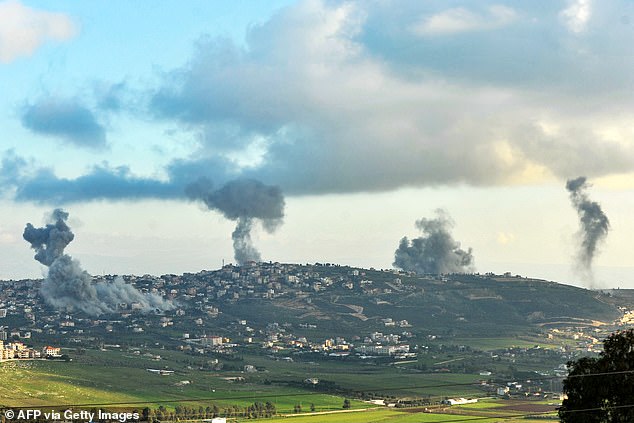No Mr. Nice Guy more: Antony Blinken meets Netanyahu in Israel after Hamas proposes ceasefire AND after reports surfaced of Biden calling Israeli PM a ‘bad damn guy’
Whether or not Antony Blinken was plagued by headlines calling him too nice to be secretary of state of the most powerful country in the world, he gave nothing away when he returned to the Middle East and its boiling crisis.
Ahead of the meeting with Israeli Prime Minister Benjamin Netanyahu, who has shown little interest in listening to American calls for restraint in Gaza, a major profile of the country’s top diplomat labeled him “weak.”
He was asked about the assessment during a press conference in Qatar on Tuesday. His response was characteristically mild-mannered.
“I let others speak to my character, and all I can say is that most people who occupy the position I now have the great privilege of taking do not get there by always being nice,” he said kindly .
A day later he met Netanyahu in Jerusalem, a prime minister rarely seen as nice.
Is Antony Blinken too nice to be Secretary of State? On Wednesday he was back in Israel, where Prime Minister Benjamin Netanyahu leads his country while paying little attention to Washington

In contrast, President Joe Biden reportedly calls Netanyahu “a bad guy in private.” Blinken will meet the Israeli prime minister in Jerusalem on Wednesday
In fact, Biden Reportedly calls him ‘a bad guy’ and fears the hardline Israeli leader plans to draw the US into a wider conflict in the Middle East.
Against that backdrop, Blinken made his fifth visit to the region in an effort to secure the release of hostages held by Hamas terrorists in Gaza and defuse tensions that have led to attacks by Iran-backed militias on international shipping and American bases.
He said “a lot of work” remains to bridge the gap between Israel and Hamas on the terms of a hostage agreement.
The terror group has offered a three-phase, 135-day plan in response to a proposal developed by Israel, Qatar, Egypt and the US. It seeks the exchange of all remaining hostages in exchange for hundreds of Palestinians in Israeli prisons.
But that would give Hamas control of Gaza, while Israel has made clear its war aim is to destroy the group’s ability to operate.
Netanyahu says the war will continue until “total victory” and has also said the two-state solution – the cornerstone of US policy in the region – is impossible.
That has led to repeated criticism that US diplomats are simply being ignored by Netanyahu, even as his government relies on Washington for diplomatic cover and military support.
So is Blinken the man to fire Netanyahu? Not according the Politico profilewhich showed how he expresses his frustration when he is angry: if there is a table in front of him, he apparently taps it for emphasis.

Israeli Army main battle tanks roll in southern Israel along the border with the Gaza Strip on February 7, 2024, amid ongoing fighting between Israel and the Palestinian militant group Hamas

People hold a sign with photos of people who died on October 7. Hamas deadly attack on the ‘Nova’ party during a memorial event held by families of victims

Smoke rises over the southern Lebanese border village of El-Khiam during the Israeli bombardment on February 7, 2024. Cross-border tension remains high
“If Blinken were to openly express his anger, Israeli Prime Minister Benjamin Netanyahu might not so easily resist his call for a future Palestinian state,” author Nahal Toosi wrote.
“Perhaps a clearly enraged Blinken about the conflict would mean that pro-Palestinian activists – like those protesting outside his home – might find more sympathy for an American position they see as staunchly pro-Israel.”
Veterans of diplomacy, however, said a calm, steady voice was more useful.
Dennis Ross, a former U.S. official who spent years working on peace efforts in the Middle East, said: “There are times and places where a secretary, both privately and at times publicly, would express a certain degree of anger and frustration. should express it, but if you use it too much, it is not such a useful instrument and it becomes devalued.’
And officials insist Blinken made his voice heard, especially in the early days of the conflict, when Israel agreed to allow aid.
“We were arguing at the time about the number of trucks of humanitarian aid coming into Gaza, and there was resistance on the Israeli side,” a Blinken adviser said.
‘Tony has made his views very clear. You couldn’t guess where he came from.’
